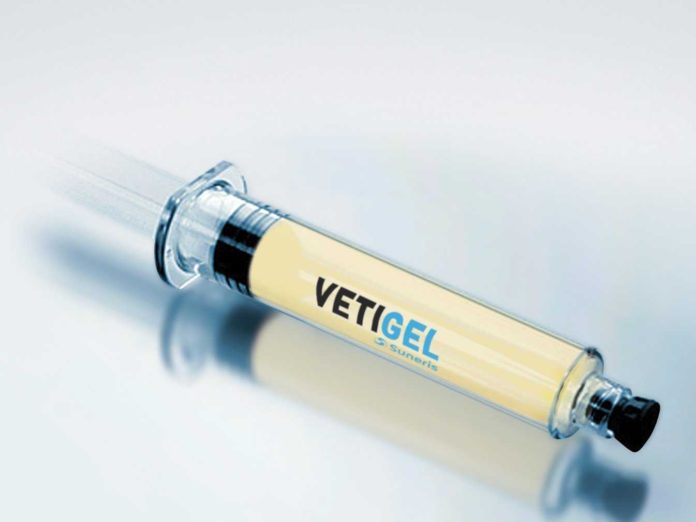
Imagine this: you’re gushing blood. Nothing seems to make it stop. Then you apply a gel to your wound, and within seconds, the bleed stops. In minutes, you’re healed.
This is the premise of VetiGel, an algae-based polymer created by Joe Landolina — a 22 year-old who invented the product when he was just 17.
Landolina is now the co-founder and CEO of Suneris, a biotech company that manufactures the gel. Last week, Suneris announced that it will begin shipping VetiGel to veterinarians later this summer. Humans won’t be far behind.
When injected into a wound site, the gel can form a clot within 12 seconds and permanently heal the wound within minutes, says Landolina.
“The fastest piece of equipment we have measures every 12 seconds,” Landolina tells Business Insider. “So we know that it happens in less than 12 seconds.”
The science that makes this all possible is surprisingly basic.
Each batch of gel begins as algae, which is made up of tiny individual polymers. If you break those polymers down into even tinier pieces, “kind of like LEGO blocks,” Landolina says, you can put them into the gel and inject that gel into a wound site.
Once it hits the damaged tissue, whether it’s open skin or a biopsied soft organ — livers, kidneys, spleens — the gel instantly forms a mesh-like structure.
“What that means, on the one hand, is that the gel will make a very strong adhesive that holds the wound together,” Landolina says. “But on the other hand, that mesh acts as a scaffold to help the body produce fibrin at the wound’s surface.”
Fibrin helps repair tissue over the long term. It’s what allows VetiGel not only to work fast in sealing leaks, but to actually heal the skin. Within a few minutes of application, the gel can be safely removed.
From classroom to company
For as fast-acting as VetiGel is, its inventor may be faster.
Landolina invented an early version of the gel out of his grandfather’s lab. He was still in high school.
As a freshman at New York University, he and a junior entered the gel in a business competition. Up against graduate students and university professors, they were they only undergraduates that entered. They took second place.
Over the next four and a half years, Landolina turned the prototype into a business. His project partner, Isaac Miller, became his co-founder and CFO. VetiGel started taking shape.
Today, Suneris is bringing VetiGel to the (four-legged) masses. The company is currently taking pre-orders from veterinarian offices and will begin shipment from its Brooklyn offices later this summer.
The first product in the rollout is a five-pack of five-milliliter syringes that costs $US150. Landolina says Suneris has its sights set on a US rollout first, followed by a release in Europe in Asia sometime early next year. The company has partnered with VetPlus, a British company focused on animal medicine, to expand its manufacturing across the pond.
A few years down the line, Landolina says, the goal will be to expand out of vet offices to help treat members of our own species.
He forecasts receiving FDA approval within the year for testing on human wounds. If all goes according to plan, VetiGel will first help military personnel and EMTs treat traumatic injuries. Then it will enter operating rooms and, finally, individual homes.
Landolina says Suneris has yet to observe any negative side effects of VetiGel. The company holds weekly meetings with veterinarians to ensure the product meets their needs.
VetiGel isn’t the only wound-healing invention of its kind. Another product, named — oddly enough — Vitagel, also helps the body stop bleeding quickly using similar methods.
A future where we no longer have to make a panicked, blood-spurting trip to the hospital? Sign us up
Source; businessinsider
